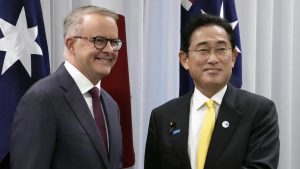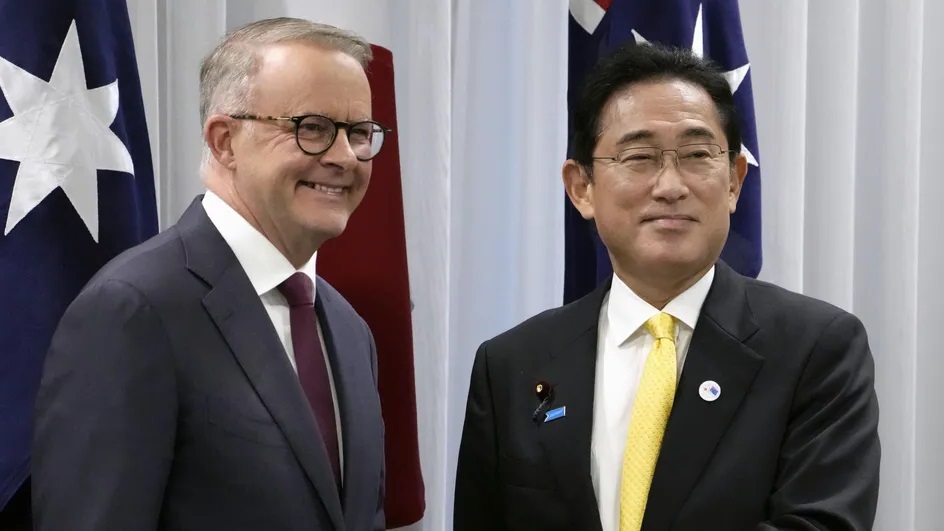In the club of correspondents, todaynewspost returns to a defense agreement concluded on Saturday October 22 between Japan and Australia, anxious to show the muscles in the face of the ambitions of the all-powerful President Xi Jinping, reappointed to the head of the Chinese Communist Party (CCP ).
 Japanese Prime Minister Fumio Kishida (left) and Australian Prime Minister Anthony Albanese (right) in Perth, Australia on October 22, 2022. (Kyodo/MAXPPP)
Japanese Prime Minister Fumio Kishida (left) and Australian Prime Minister Anthony Albanese (right) in Perth, Australia on October 22, 2022. (Kyodo/MAXPPP)
Xi Jinping obtained a third coronation at the head of the CCP on Sunday October 23. The Chinese president, 69, arrogates full powers to himself, and was reappointed in the process as chief of the armies. The opportunity to look at Beijing’s sphere of influence in Asia, particularly with Australia and Japan. Two trading partners who remain on their guard militarily.
In Australia, strengthen military cooperation with its allies
Australian Prime Minister Anthony Albanese signed a security pact with his Japanese counterpart, Fumio Kishida, on Saturday October 22. The agreement currently covers the exchange of information from their respective networks of electronic listening satellites. The two countries have also pledged to strengthen their military cooperation.
A strong signal sent to the Indo-Pacific region according to Anthony Albanese, who has already met Fumio Kishida four times since his election last May and who, according to him, confirms the strategic alignment between the two countries. Australia confirms with this pact its desire to strengthen its military cooperation with its allies. Already last year, it joined the Aukus alliance, with the United States and the United Kingdom.
Japanese Prime Minister Fumio Kishida is a great friend of Australia, and I was proud to show him around Perth this weekend. @JPN_PMO pic.twitter.com/L6cU1M4IHX
— Anthony Albanese (@AlboMP) October 23, 2022
At the same time, the arrival last May of the new Australian Prime Minister, from the Labor Party, has somewhat improved relations with Beijing. Contact has been re-established between the two governments. In Scott Morrison’s time, the Chinese weren’t even answering calls from Australians. This is no longer the case today, and it is mainly due to the Prime Minister’s desire to calm things down. Unlike his predecessor, he does not speak of a threat, or of danger, each time it evokes China.
This change in tone has been noticed by Beijing, and it is appreciated. At least on the surface, because basically, nothing has changed. China made no move. Trade sanctions imposed two years ago on various Australian export products have still not been lifted and Canberra is still without news of Chinese-Australian journalist Cheng Lei, arrested two years ago for alleged crimes. spying.
In Japan, detaching from American military support
The relations forged between Japan and Australia, on the economic and military levels, are part of a broader strategy of multilateral alliances that Japan has strongly supported since 2016 with the aim of guaranteeing an Indo- Free and open Pacific. A space in which the transport of goods and energy can be exercised without hindrance and where no one assumes particular rights. Guaranteeing the safety of the region for economic reasons, these are the two main points.
Behind this, we obviously read a desire to curb the expansion of China, which tends to appropriate maritime spaces, for example by building artificial islands in the South China Sea. A China whose activities Japan also fears near its uninhabited Senkaku islets claimed by Beijing, not to mention of course the threat to Taiwan.
All of these points must be put into perspective with the granting of a third term to Xi Jinping as head of the CCP. Japan and China celebrated the 50th anniversary of the normalization of their diplomatic relations a few days ago. What has become clear in recent years, and even more so in recent months, is that the decoupling between difficult political relations and close economic relations is only an illusion in the long run.
It is clear that Japan is not reassured. The Japanese archipelago really feels stuck between three threats: that of China, that of Russia and that of North Korea. As a result, and despite a constitution that restricts its military prerogatives, Japan wants to strengthen its defense. The latter is above all dependent on the goodwill of the American ally and protector. Prime Minister Kishida announced this summer that he would substantially increase the defense budget. A decision so sudden that the officials of the ministry in question were taken aback and do not know for the moment how to spend the amounts granted to them.
It will be necessary to follow what happens in the future with this increase, but it must be kept in mind that a good part of the Japanese population is hardly reassured by the escalation of armed means which is currently being played out in Asia.
